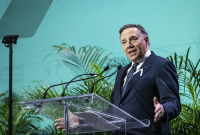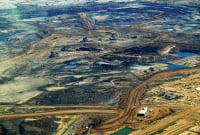Support strong Canadian climate journalism for 2025
New figures reveal rich countries are inching closer to delivering on a long-standing promise to deliver $100 billion worth of climate finance to developing countries, but actually accessing the cash remains a massive challenge.
On Thursday, the Organization for Economic Co-operation and Development (OECD) said developed countries delivered US$89.6 billion in 2021, the most recent figures available. That’s still $10 billion short but represents an eight per cent increase from 2020 levels. The money is grouped into three categories: mitigation, adaptation and cross-cutting (referring to projects that both reduce emissions and adapt to climate change). The OECD found, in absolute terms, more money is being made available, but financing specifically for adaptation fell by US$4 billion from 2020 levels, representing a 14 per cent drop. From 2020 to 2021, mitigation financing increased by $5.1 billion, and cross-cutting financial support grew by $5.2 billion.
In its analysis, the OECD noted many countries have committed to providing more finance, and based on preliminary and unverified data, the organization believes the $100-billion target was likely met last year. However, because of time lags in reporting the actual financial activity, that cannot yet be confirmed.
In the lead-up to COP26 in 2021, Canada and Germany were tapped to develop a delivery plan for the $100 billion, recognizing ambitious agreements to tackle climate change will grow further out of reach if trust is broken between countries in the Global North and South. On Thursday, Canada’s Environment and Climate Change Minister Steven Guilbeault and Germany’s climate envoy Jennifer Morgan spoke to reporters about the OECD’s figures, calling it an important milestone.
Guilbeault said the OECD’s findings provide a good foundation for negotiations at COP28 in Dubai, set to kick off later this month.
Because the goal had been promised and not met, “I have heard very loudly and very clearly from a number of representatives from the Global South that this showed countries like Canada and many others weren't serious in their support of developing countries in their efforts to tackle climate change,” Guilbeault said. “So I think having this information by the OECD showing we have met that goal is an important milestone, but that's what it is a milestone. It doesn't solve all of our problems.”
Morgan said of the OECD’s findings that she hopes it will help build confidence in the negotiations, but agreed more work was needed. A top priority for her is access. Because many poorer countries are already dealing with high levels of debt, climate finance provided in loans adds to their debt burden, making it unattractive. Civil society groups have long called for more climate finance to be provided in grants rather than loans.
“As we look beyond the $100-billion goal, we will continue engaging with climate finance recipients and the broader contributor community to tackle access challenges,” she said.
With countries set to discuss growing climate finance needs, the OECD predicts developing countries will require US$1 trillion annually by 2025 for climate investments, quickly rising to an average of US$2.4 trillion each year between 2026 and 2030.
“To close this investment and financing gap, they will need to harness a range of financial sources across public, private, domestic, and international finance,” the OECD said. “Although public finance can only contribute a share of these extensive needs, increased involvement of international providers is key.”
Climate Action Network Canada’s senior international policy analyst Pratishtha Singh told Canada’s National Observer that while it's encouraging to see the $100-billion target has likely been met, it’s still two years late.
“It’s also concerning that adaptation finance dropped in 2021, at a time when it’s more important than ever for communities to prepare for escalating climate impacts,” she said. “Adaptation saves lives, and we need to see strong movement at COP28 on closing the adaptation gap.”
She also said the OECD report should help repair trust between Global North and South countries at COP28, where she said the conversation should shift from billions of dollars to trillions of dollars “to match the scale of the crisis.”






Comments